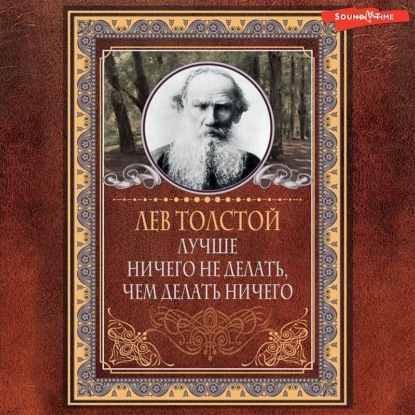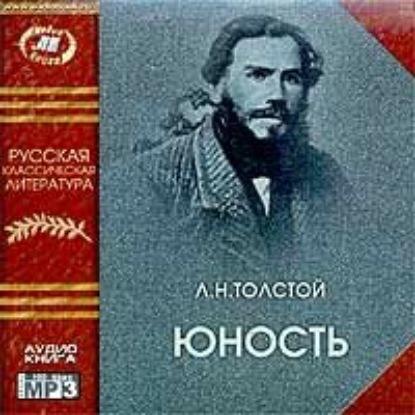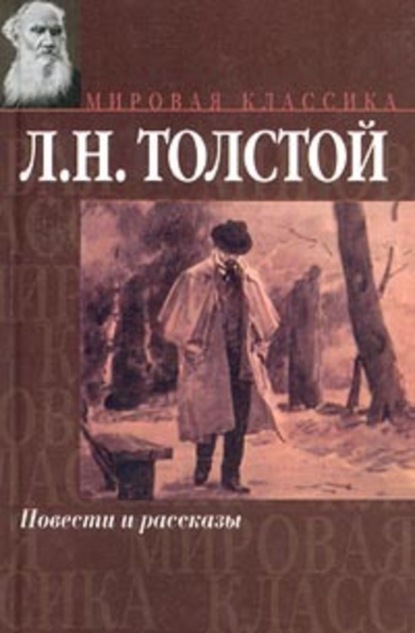 Полная версия
Полная версияПолная версия:
Лев Николаевич Толстой What Shall We Do?
- + Увеличить шрифт
- - Уменьшить шрифт

Tolstoy Leo, graf
What Shall We Do?
CHAPTER I
After having passed the greater part of my life in the country, I came at length, in the year 1881, to reside in Moscow, where I was immediately struck with the extreme state of pauperism in that city. Though well acquainted with the privations of the poor in rural districts, I had not the faintest conception of their actual condition in towns.
In Moscow it is impossible to pass a street without meeting beggars of a peculiar kind, quite unlike those in the country, who go about there, as the saying is, “with a bag and the name of Christ.”
The Moscow beggars neither carry a bag nor ask for alms. In most cases when they meet you, they try to catch your eye, and then act according to the expression of your face.
I know of one such, a bankrupt gentleman. He is an old man who advances slowly, limping painfully with each leg. When he meets you, he limps, and makes a bow. If you stop, he takes off his cap, ornamented with a cockade, bows again, and begs. If you do not stop, he pretends to be only lame, and continues limping along.
That is a specimen of a genuine Moscow beggar, an experienced one.
At first I did not know why such mendicants did not ask openly; but afterwards I learned why, without understanding the reason.
One day I saw a policeman push a ragged peasant swollen with dropsy, into a cab. I asked what he had been doing, and the policeman replied, —
“Begging.”
“Is begging, then, forbidden?”
“So it seems,” he answered. As the man was being driven away, I took another cab, and followed. I wished to find out whether begging was really forbidden, and if so, why? I could not at all understand how it was possible to forbid one man asking something from another; and, moreover, I had my doubts whether it could be illegal in a city where it flourished to such an extent.
I entered the police-station where the pauper had been taken, and asked an official armed with sword and pistol, and seated at a table, what he had been arrested for.
The man looked up at me sharply, and said, “What business is that of yours?”
However, feeling the necessity of some explanation, he added, “The authorities order such fellows to be arrested, so I suppose it is necessary.”
I went away. The policeman who had brought the man was sitting in the window of the ante-room, studying his note-book. I said to him, —
“Is it really true that poor people are not allowed to ask for alms in Christ's name?”
The man started, as if waking up from a sleep, stared at me, then relapsed again into a state of stolid indifference, and, reseating himself on the window-sill, said, —
“The authorities require it, so you see it is necessary.”
As he became again absorbed in his note-book, I went down the steps towards my cab.
“Well! have they locked him up?” asked the cabman. He had evidently become interested in the matter.
“They have,” I answered. He shook his head.
“Is begging forbidden in Moscow, then?” I asked.
“I can't tell you,” he said.
“But how can a man be locked up,” I said, “for begging in the name of Christ?”
“Nowadays things have changed, and you see it is forbidden,” he answered.
Since then, I have often seen policemen taking paupers to the police-station and thence to the work-house. Indeed, I once met a whole crowd of these poor creatures, about thirty, escorted before and behind by policemen. I asked what they had been doing.
“Begging,” was the reply.
It appears that, according to law, begging is forbidden in Moscow, notwithstanding the great number of beggars one meets there in every street, notwithstanding the rows of them near the churches during service-time, and especially at funerals. But why are some caught and locked up, while others are let alone? This I have not been able to find out. Either there are lawful and unlawful beggars amongst them, or else there are so many that it is impossible to catch them all; or, perhaps, though some are taken up, others fill their places.
There is a great variety of such beggars in Moscow. There are those who live by begging. There are also entirely honest destitute people who have somehow chanced to reach Moscow and are really in extreme need.
Amongst the latter are men and women evidently from the country. I have often met these. Some of them, who had fallen ill and afterwards recovered and left the hospital, could now find no means, either of feeding themselves, or of getting away from Moscow; some of them, besides, had taken to drink (this was probably the case with the man with dropsy whom I met); some were in good health, but had been burned out of house and home, or else were very old, or were widowed or deserted women with children; and some others had sound health, and were quite capable of working.
These robust people especially interested me, – the more so, because, since my arrival in Moscow, I had contracted the habit of going to the Sparrow Hills for the sake of exercise, and working there with two peasants who sawed wood. These men were exactly like the beggars whom I often met in the streets. One, called Peter, was an ex-soldier from Kaluga; the other, Simon, was from Vladímir. They possessed nothing save the clothes on their backs: and they earned, by working very hard, from forty to forty-five kopeks (8d. to 9d.) a day; out of this they both put a little aside, – the Kaluga soldier, to buy a fur coat; the Vladímir peasant, to get money enough to return to his home in the country.
Meeting in the streets similar men, I was therefore particularly interested in them, and could not understand why some begged whilst others worked.
Whenever I met a beggar of this description, I used to ask him how it was that he had come to such a state. Once I met a strong, healthy-looking peasant who asked alms. I questioned him as to who he was, and whence he had come.
He told me he had come from Kaluga, in search of work. He had at first found some, such as sawing old timber into fire-wood; but after he and his companion had finished that job, though they had continually looked for it, they had not found any more work, his mate had left him, and he himself had passed a fortnight in the utmost need, and having sold all he had to get food, now had not enough even to buy the necessary tools for sawing.
I gave him money to get a saw, and told him where to go for work. I had previously arranged with Peter and Simon that they should accept a new fellow-worker, and find him a mate.
“Be sure you come! There is plenty of work to be done,” I said on parting.
“You can reckon on me,” he answered. “Do you think there is any pleasure in knocking about, begging, if I can work?”
The man solemnly promised that he would come; and he seemed honest, and really meaning to work.
Next day, on coming to my friends, Peter and Simon, I asked them whether the man had arrived. They said he had not; and, indeed, he never came at all. In this way I was frequently deceived.
I have also been deceived by those who said that they only wanted a little money to buy a ticket to return home, and whom I met in the streets again a few days later. Many of them I came to know well, and they knew me; though occasionally having forgotten me, they would repeat the same false tale; but sometimes they would turn away on recognizing me.
In this way I discovered, that, even in this class of men, there are many rogues.
Still, these poor rogues were also very much to be pitied: they were all ragged and hungry; they were of the sort who die of cold in the streets, or hang themselves to escape life, as the papers frequently tell us.
CHAPTER II
When I talked to my town friends about this pauperism which surrounded them, they always replied, “Oh! you have seen nothing yet! You should go to the Khitrof Market, and visit the lodging-houses there, if you want to see the genuine ‘Golden Company.’”
One jovial friend of mine added, that the number of these paupers had so increased, that they already formed not a “Golden Company,” but a “Golden Regiment.”
My witty friend was right; but he would have been yet nearer the truth had he said that these men formed, in Moscow, not a company, nor a regiment, but a whole army, – an army, I should judge, of about fifty thousand.
The regular townspeople, when they spoke to me about the pauperism of the city, always seemed to feel a certain pleasure or pride in being able to give me such precise information.
I remember I noticed, when visiting London, that the citizens there seemed also to find a certain satisfaction in telling me about London destitution, as though it were something to be proud of.
However, wishing to inspect this poverty about which I had heard so much, I had turned my steps very often towards the Khitrof Market, – but on each occasion I felt a sensation of pain and shame. “Why should you go to look at the suffering of human beings whom you cannot help?” said one voice within me. “If you live here, and see all that is pleasant in town life, go and see also what is wretched,” replied another.
And so, one cold, windy day in December, two years ago (1883), I went to the Khitrof Market, the centre of the town pauperism.
It was on a week-day, about four in the afternoon. While still a good distance off I noticed greater and greater numbers of men in strange clothes, – evidently not originally meant for them, – and in yet stranger foot-wear; men of a peculiar unhealthy complexion, and all apparently showing a remarkable indifference to everything that surrounded them.
Men in the strangest, most incongruous costumes sauntered along, evidently without the least thought as to how they might look in the eyes of others. They were all going in the same direction. Without asking the way, which was unknown to me, I followed them, and came to the Khitrof Market.
There I found women likewise in ragged capes, rough cloaks, jackets, boots, and goloshes. Perfectly free and easy in their manner, notwithstanding the grotesque monstrosity of their attire, these women, old and young, were sitting, bargaining, strolling about, and abusing one another.
Market-time having evidently passed, there were not many people there; and as most of them were going up-hill, through the market-place, and all in the same direction, I followed them.
The farther I went, the greater became the stream of people flowing into the one road. Having passed the market, and gone up the street, I found that I was following two women, one old, the other young. Both were clothed in some grey ragged stuff. They were talking, as they walked, about some kind of business.
Every expression was unfailingly accompanied by some obscene word. Neither was drunk, but each absorbed with her own affairs; and the passing men, and those about them, paid not the slightest attention to their language, which sounded so strange to me. It appeared to be the generally accepted manner of speech in those parts. On the left we passed some private night-lodging-houses, and some of the crowd entered these; others continued to ascend the hill towards a large corner house. The majority of the people walking along with me went into this house. Before it, people all of the same sort were standing and sitting, on the sidewalk and in the snow.
At the right of the entrance were women; at the left, men. I passed by the men: I passed by the women (there were several hundreds in all), and stopped where the crowd ceased.
This building was the “Liapin free night-lodging-house” (“doss-house”). The crowd was composed of night-lodgers, waiting to be let in. At five o'clock in the evening this house is opened and the crowd admitted. Hither came almost all the people whom I followed.
I remained standing where the file of men ended. Those nearest stared at me till I had to look at them. The remnants of garments covering their bodies were very various; but the one expression of the eyes of all alike seemed to be, “Why are you, a man from another world, stopping here with us? Who are you? Are you a self-satisfied man of wealth, desiring to be gladdened by the sight of our need, to divert yourself in your idleness, and to mock at us? or are you that which does not and can not exist, – a man who pities us?”
On all their faces the same question was written. Each would look at me, meet my eyes, and turn away again.
I wanted to speak to some of them, but for a long time I could not summon up courage. However, eventually our mutual exchange of glances introduced us to each other; and we felt that, however widely separated might be our social positions in life, we were still fellow-men, and so we ceased to be afraid of one another.
Next to me stood a peasant with a swollen face and red beard, in a ragged jacket, with worn-out goloshes on his naked feet, though there were eight degrees of frost.1 For the third or fourth time our eyes met; and I felt so drawn to him that I was no longer ashamed to address him (to have refrained from doing so would have been the only real shame), and I asked him where he came from.
He answered eagerly, while a crowd began to collect round us, that he had come from Smolensk in search of work, to be able to buy bread and pay his taxes.
“There is no work to be had nowadays,” he said: “the soldiers have got hold of it all. So here am I knocking about; and God is my witness, I have not had any thing to eat for two days.”
He said this shyly, with an attempt at a smile. A seller2 of warm drinks, an old soldier, was standing near. I called him, and made him pour out a glass. The peasant took the warm vessel in his hands, and, before drinking, warmed them against the glass, trying not to lose any of the precious heat; and whilst doing this he related to me his story.
The adventures of these people, or at least the stories which they tell, are almost always the same: He had had a little work; then it had ceased: and here, in the night-lodging-house, his purse, containing his money and passport, had been stolen from him. Now he could not leave Moscow.
He told me that during the day he warmed himself in public-houses, eating any stale crust of bread which might be given him. His night's lodging here in Liapin's house cost him nothing.
He was only waiting for the round of the police-sergeant to lock him up for being without his passport, when he would be sent on foot, with a party of men similarly situated, to the place of his birth.
“They say the inspection will take place on Thursday, when I shall be taken up; so I must try and keep on until then.” (The prison and his compulsory journey appeared to him as the “promised land.”) While he was speaking, two or three men in the crowd said they were also in exactly the same situation.
A thin, pale youth, with a long nose, only a shirt upon his back, and that torn about the shoulders, and a tattered cap on his head, edged his way to me through the crowd. He was shivering violently all the time, but tried, as he caught my eye, to smile scornfully at the peasant's conversation, thinking thus to show his superiority.
I offered him some drink.
He warmed his hands on the tumbler as the other had done; but just as he began to speak, he was shouldered aside by a big, black, hook-nosed, bare-headed fellow, in a thin shirt and waistcoat, who also asked for some drink.
Then a tall old man, with a thin beard, in an overcoat fastened round the waist with a cord, and in bark shoes, had some. He was drunk.
Then came a little man, with a swollen face and wet eyes, in a coarse brown jacket, with his knees protruding through his torn trousers and knocking against each other with cold. He shivered so that he could not hold the glass, and spilled the contents over his clothes: the others began to abuse him, but he only grinned miserably, and shivered.
After him came an ugly, deformed man in rags, and with bare feet. Then an individual of the officer type; another belonging to the church class; then a strange-looking being without a nose, – all of them hungry, cold, suppliant, and humble, – crowded round me, and stretched out their hands for the glass; but the drink was exhausted. Then one man asked for money: I gave him some. A second and a third followed, till the whole crowd pressed on me. In the general confusion the gatekeeper of the neighbouring house shouted to the crowd to clear the pavement before his house, and the people submissively obeyed.
Some of them undertook to control the tumult, and took me under their protection. They attempted to drag me out of the crush. But the crowd that formerly had lined the pavement in a long file, had now become condensed about me. Every one looked at me and begged; and it seemed as if each face were more pitiful, harassed, and degraded than the other. I distributed all the money I had, – only about twenty rubles, – and entered the lodging-house with the crowd. The house was an enormous one, and consisted of four parts. In the upper storeys were the men's rooms; on the ground-floor the women's. I went first into the women's dormitory, – a large room, filled with beds resembling the berths in a third-class railway-carriage. They were arranged in two tiers, one above the other.
Strange-looking women in ragged dresses, without jackets, old and young, kept coming in and occupying places, some below, others climbing above. Some of the elder ones crossed themselves, pronouncing the name of the founder of the refuge. Some laughed and swore.
I went up-stairs. There, in a similar way, the men had taken their places. Amongst them I recognized one of those to whom I had given money. On seeing him I suddenly felt horribly ashamed, and made haste to leave.
With a sense of having committed some crime, I returned home. There I entered along the carpeted steps into the rug-covered hall, and, having taken off my fur coat, sat down to a meal of five courses, served by two footmen in livery, with white ties and white gloves. A scene of the past came suddenly before me. Thirty years ago I saw a man's head cut off under the guillotine in Paris before a crowd of thousands of spectators. I was aware that the man had been a great criminal: I was acquainted with all the arguments in justification of capital punishment for such offences. I saw this execution carried out deliberately: but at the moment that the head and body were severed from each other by the keen blade, I gasped, and realized in every fibre of my being, that all the arguments which I had hitherto heard in favour of capital punishment were wickedly false; that, no matter how many might agree that it was a lawful act, it was literally murder; whatever other title men might give it, they thus had virtually committed murder, that worst of all crimes: and there was I, both by my silence and my non-interference, an aider, an abetter, and participator in the sin.
Similar convictions were again forced upon me when I now beheld the misery, cold, hunger, and humiliation of thousands of my fellow-men. I realized not only with my brain, but in every pulse of my soul, that, whilst there were thousands of such sufferers in Moscow, I, with tens of thousands of others, daily filled myself to repletion with luxurious dainties of every description, took the tenderest care of my horses, and clothed my very floors with velvet carpets!
Whatever the wise and learned of the world might say about it, however unalterable the course of life might seem to be, the same evil was continually being enacted, and I, by my own personal habits of luxury, was a promoter of that evil.
The difference between the two cases was only this: that in the first, all I could have done would have been to shout out to the murderers standing near the guillotine, who were accomplishing the deed, that they were committing a murder, and by every means to try to hinder them, – while, of course, knowing that my interference would be in vain. Whereas, in this second case, I might have given away, not only the drink and the small sum of money I had with me, but also the coat from off my shoulders, and all that I possessed at home. Yet I had not done so, and therefore felt, and feel, and can never cease to feel, that I myself am a partaker in a crime which is continually being committed, so long as I have superfluous food whilst others have none, so long as I have two coats whilst there exists one man without any.
CHAPTER III
On the same evening that I returned from Liapin's house, I imparted my impressions to a friend: and he, a resident of the town, began to explain to me, not without a certain satisfaction, that this was the most natural state of things in a town; that it was only owing to my provincialism that I found anything remarkable in it; and that it had always been, and always would be so, such being one of the inevitable conditions of civilization. In London it was yet worse, etc., etc., therefore there could be nothing wrong about it, and there was nothing to be disturbed or troubled about.
I began to argue with my friend, but with such warmth and so angrily, that my wife rushed in from the adjoining room to ask what had happened. It appeared that, without being aware of it, I had shouted out in an agonized voice, gesticulating wildly, “We should not go on living in this way! we must not live so! we have no right!” I was rebuked for my unnecessary excitement; I was told that I could not talk quietly upon any question, that I was irritable; and it was pointed out to me that the existence of such misery as I had witnessed was in no way a reason for embittering the life of my home-circle.
I felt that this was perfectly just, and held my tongue; but in the depth of my soul I knew that I was right, and I could not quiet my conscience.
The town life, which had previously seemed alien and strange to me, now became so hateful that all the indulgencies of a luxurious existence, in which I had formerly delighted, began to torment me.
However much I tried to find some kind of excuse for my mode of life, I could not contemplate without irritation either my own or other people's drawing-rooms, nor a clean, richly served dinner-table, nor a carriage with well-fed coachman and horses, nor the shops, theatres, and entertainments. I could not help seeing, in contrast to all this, those hungry, shivering, and degraded inhabitants of the night-lodging-house. I could never free myself from the thought that these conditions were inseparable – that the one proceeded from the other. I remember that the sense of culpability which I had felt from the first moment never left me; but with this feeling another soon mingled, which lessened the first.
When I talked to my intimate friends and acquaintances about my impressions in Liapin's house, they all answered in the same way, and expressed besides their appreciation of my kindness and tender-heartedness, and gave me to understand that the sight had impressed me so because I, Leo Tolstoy, was kind-hearted and good. And I willingly allowed myself to believe this.
The natural consequence of this was, that the first keen sense of self-reproach and shame became blunted, and was replaced by a sense of satisfaction at my own virtue, and a desire to make it known to others. “It is, in truth,” I said to myself, “probably not my connection with a luxurious life which is at fault, but the unavoidable circumstances of existence. Therefore a change in my particular life would not alter the evil I had seen.”
In changing my own life, I thought, I should only render myself and those nearest and dearest to me miserable, whilst the other misery would remain; therefore my object should be, not to alter my own way of living, as I had at first imagined, but to try as much as was in my power to ameliorate the position of those unfortunate ones who had excited my compassion. The whole matter, I reasoned, lies in the fact that I, being an extremely kind and good man, wish to do good to my fellow-men.
So I began to arrange a plan of philanthropic activity in which I might exhibit all my virtues. I must, however, remark here, that, while planning this charitable effort, in the depth of my heart I felt that I was not doing the right thing; but, as too often happens, reason and imagination stifled the voice of conscience.
About this time the census was being taken, and this seemed to me a good opportunity for instituting that charitable organization in which I wanted to shine.







